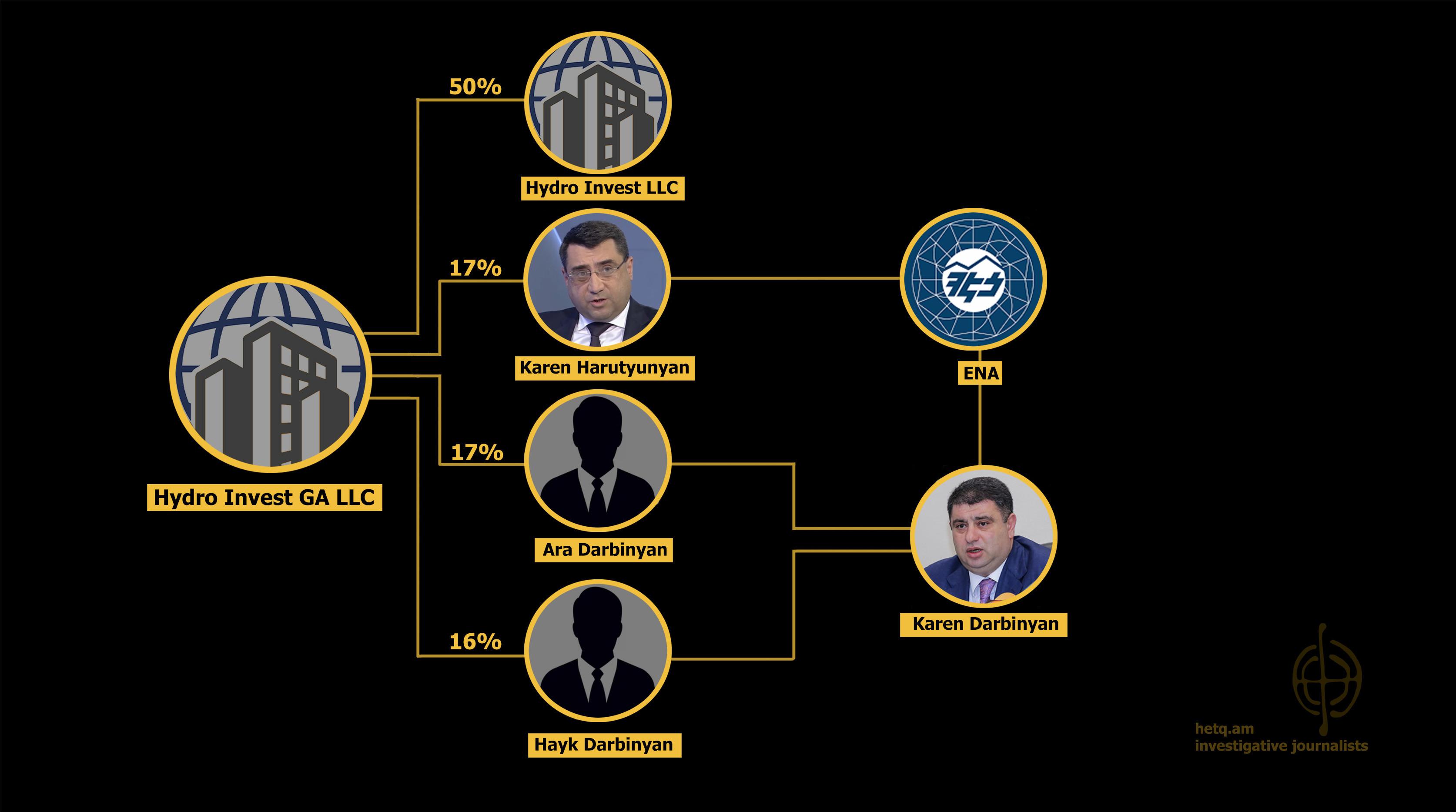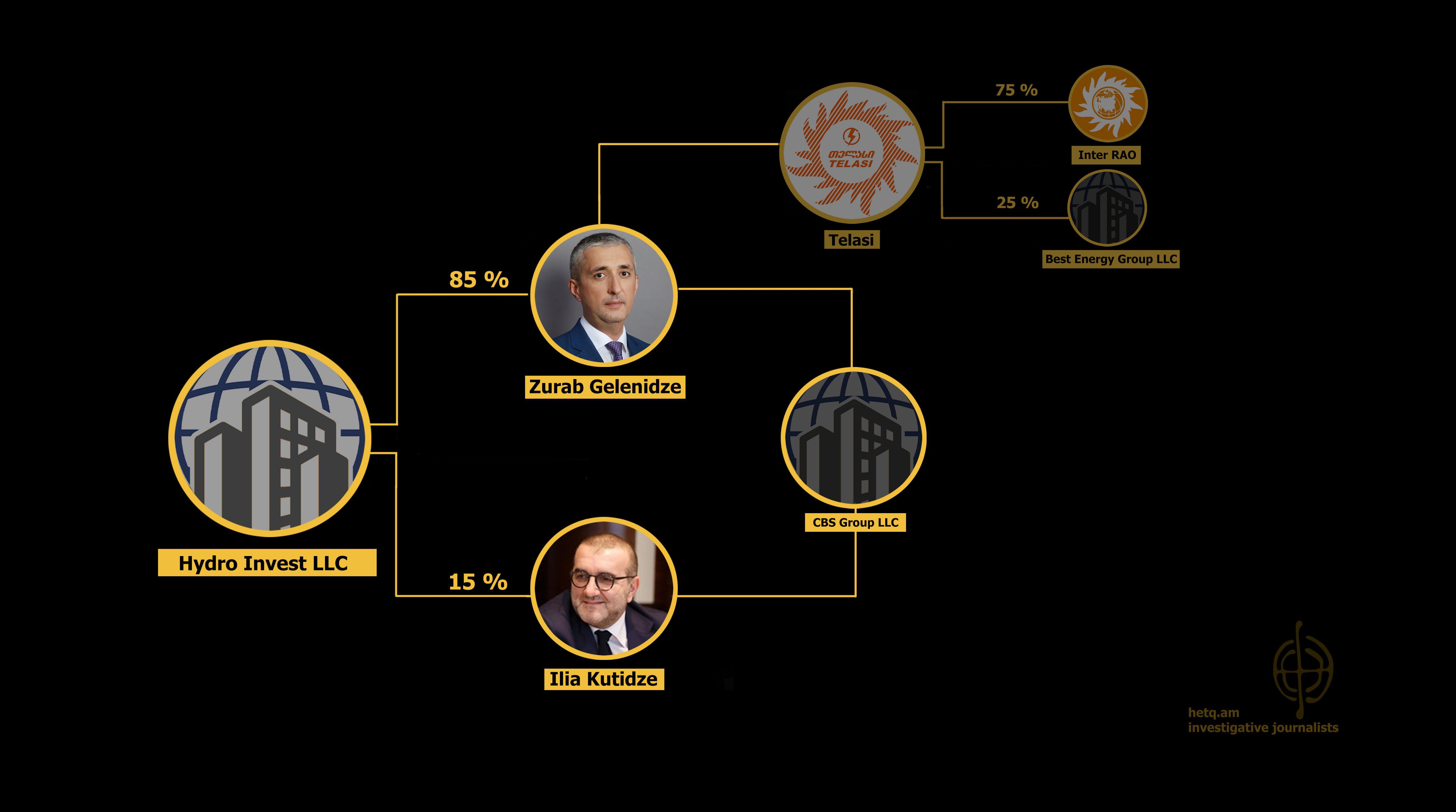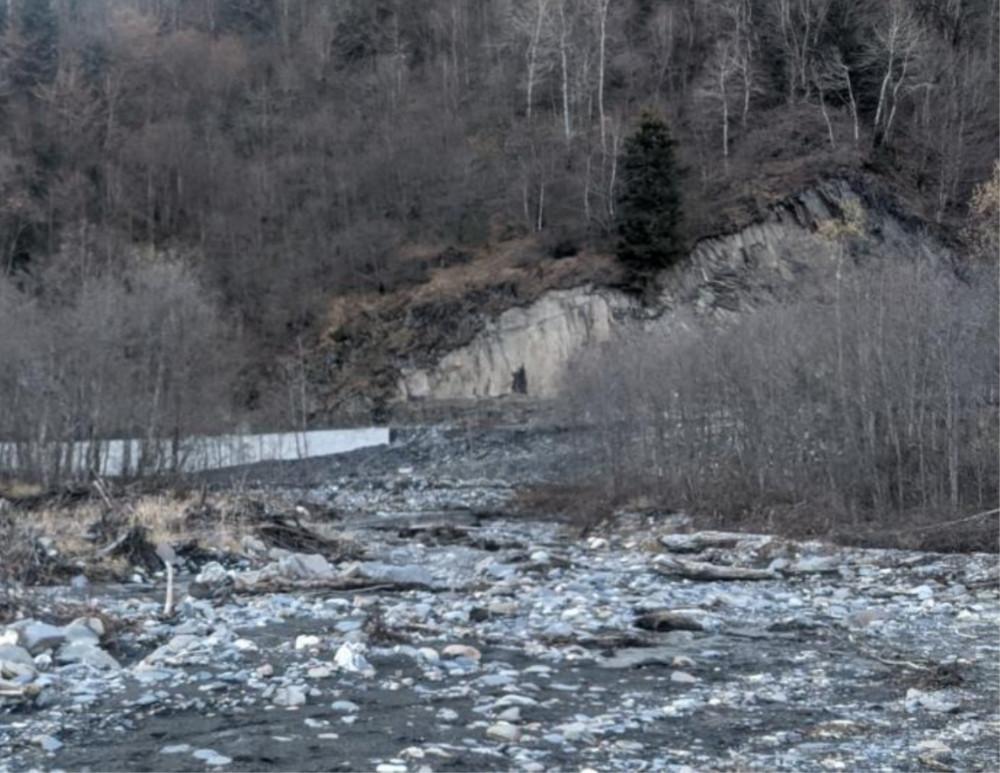
Electric Networks of Armenia Officials Investing in Georgian Hydropower Plants
Kristine Aghalaryan, Tsira Gvasalia, Indira Evgenidze
Wealthy and well-connected businessmen from Georgia and Armenia, with Russian money and ties, are going to build three small hydropower plant projects, on four small rivers in three municipalities in Georgia.
The municipalities are Mestia and Lentekhi (Svaneti region) and Shuakhev (Ajaria). The impacted rivers are Tskhenistsqali, Zeskho, Koruldashi in Svaneti and the Chirukhistskali in Ajaria.
To build these three hydropower plants, two companies were registered in the State Register of Georgia in the same month: Hydro Invest LLC on March 23, 2021 and Hydro Invest GA LLC on March 25, 2021.
Zurab Gelenidze owns 85% of Hydro Invest LLC is. He is the Deputy Chairman of the Supervisory Board of the open joint-stock company Telasi, the electricity distribution network of Georgia. Telasi is 75% owned by the Russian Inter RAO public joint-stock company. The remaining 25%, according to Telasi's official website, belongs to Best Energy Group LLC. Gelenidze is also the Deputy Director General of CBS Group LLC., a telecommunications company in Georgia.
Ilia Kutidze owns the remaining 15% of Hydro Invest LLC. Kutidze serves as CBS Group LLC Deputy Executive Director.
Hydro Invest LLC has a 50 percent stake in the second company, Hydro Invest GA LLC. The remaining 50% is owned by representatives of Electric Networks of Armenia CJSC (ENA). According to the documents obtained from the State Register of Georgia, at the time of establishment, the 50% shareholder of Hydro Invest GA LLC was Karen Harutyunyan, the general director of Hydro Invest GA.
In May, 2022, Karen Harutyunyan donated 17% and 16% of his shares to Ara and Hayk Darbinyan respectively. A 17% share remained under his management. Ara and Hayk Darbinyan are the sons of Karen Darbinyan, the former vice-president of the Tashir Group of Companies and the chairman of the ENA board of directors.
Karen Darbinyan's sons are also active in the Armenian energy sector. Ara Darbinyan has a 75% share in Energy Power LLC, founded in 2021. His brother Hayk owns 50% of Solar Park LLC, founded in 2018. Karen Harutyunyan's son, Sergey Harutyunyan, owns a 25% share in Solar Park LLC.
Solar Park operates the 5,000 kW Ddmasar solar power plant in Armenia’s Aragatzotn Province.
Solar Park is also a shareholder of HHD Solar LLC, established in 2019, which also operates the 5,000 kW Partizak 1 and 1,200 kW Partizak 2 solar plants in Aragatzotn Province.
According to the Declaration of Real Owners, Tashir Group founder Samvel Karapetyan owns 31.8%, and his son Sargis Karapetyan owns 29% of Electric Networks of Armenia CJSC. The identity of the remaining shareholder has not been made public, given the law on the books regarding shares amounting to less than ten percent.
The documents of the State Register of Companies of Georgia reveal that on December 24, 2021 Karen Harutyunyan authorized Zurab Gelenidze to appear on his behalf in the company's general meeting as a full representative and make decisions as a partner of the company for the following purposes: to give consent to the credit funds received by the company, to formulate in the name of the company "TBS Bank" joint stock company for an indefinite period, to credit funds received in any currency and any amount, and to pledge 50% of the existing share in the capital of "Hydro Invest GE" LLC for their security. Karen Harutyunyan gave this power of attorney to Georgian partners when he was still the owner of 50% of the share. The document reveals that loan funds from the Georgian bank will be invested in the Armenian-Georgian joint initiative, but the amount is not clear.
Hydro-plants threaten Georgia’s environment
All three sites for the hydropower plants include Georgia's national forestry or emerald locations. In all three cases, research on biodiversity was not sufficient to provide an accurate picture of the situation.
Tskhenistsqali river hydropower plant plan
The largest hydroelectric power plant with a capacity of 21.85 MW will be built in Lentekhi municipality of the Svaneti region. It will be on the Tskhenistsqali river.
Georgia's Biodiversity and Forestry Agency reported that the research period for the Tskhenistsqali River Hydropower Project, October-November 2021, is not sufficient to get a comprehensive picture of its impact. At least two seasonal inspections are needed to truly assess the situation.
According to the framework document, the project area includes the emerald terrain, the so-called Svaneti-Racha section.
The Emerald Network consists of areas of special conservation Iinterest for the conservation of Europe's wild flora and fauna and their natural habitats, launched in 1989 by the Council of Europe as part of the Bern Convention on the Conservation of European Wildlife and Natural Habitats. The Convention entered into force on June 1, 1982. The Parliament of Georgia ratified the Bern Convention on December 30, 2008.
The National Forestry Agency of Georgia wrote to the National Environment Agency that 31,596 of the 35,015 square meters of the project area are state forest areas owned by the National Forestry Agency. In a letter, the National Forestry Agency stated that any project in this area requires a special permit from the relevant agency.
According to framework document, the project territory is a habitat of five species of birds [[Aquila chrysaetos, Dryocopus martius, Gypaetus barbatus, Gyps fulvus, Pyrrhocorax pyrrhocorax]] protected via 6th resolution of Bern Convention, which were not detected during the research period
Since the survey period was not satisfactory for finding reptiles and amphibians in the project area, the subject was included in other surveys conducted in this area. According to scientific literature, the Caucasian viper [Latin name: Vipera kaznakovi] is widespread in this area. This type of reptile is included in Resolution 6 of the Bern Convention, as well as in the Red List Species of Georgia.
All three rivers, Tskhenistsqali, Zeskho and Ghoruldashi, are favorable habitat for trout. While working on the framework document, one trout fish was found in the Zeskho River, as well as in the Tskhenistsqali river. River trout [Latin name: Salmo fario Linnaeus] are protected by the Red Book of Georgia as vulnerable, with a tendency to decline in the natural environment.
Project of hydroelectric dams to be built on the Zeskho and Koruldashi rivers
The second hydroelectric power plant in the Svaneti region will be built in Lentekhi municipality, on the Zeskho and Koruldashi rivers, with a capacity of 20.3 MW.
During the survey, no trout were found in the Koruldashi River. The framework document states that the river was murky because heavy equipment was operating upstream and trout might exist inthe cleaner part of the river. Georgia's Biodiversity and Forestry Agency says the research should have been done when the river was clean and there should have been a special project to protect the fish.
The Department of Biodiversity and Forestry of the Ministry of Environment and Agriculture of Georgia wrote in a corresponding letter to the Environment Agency that the framework document should contain an accurate count of trees, which would include the exact number and range.
Of the 42,977 square meters of the project area, 23,167 square meters are in the territory of the National Forestry Agency and special permission is needed to implement the project there.
Hydroelectric project to be built on the Chirukhistskali river
The third hydroelectric power plant with a capacity of 5.3 MW will be built on the Chirukhistskali river in the Shuakhev municipality of Ajaria.
A biodiversity impact study was conducted in November 2021 to prepare the framework document for the hydroelectric plant. The Department of Biodiversity and Forestry of the Ministry of Environment and Agriculture of Georgia wrote in a letter to the Environment Agency that the research period is not sufficient and field research should be carried out for at least two seasons to get a more realistic picture of the situation.
The area includes an Emerald Network site and a special bird habitat area.
According to the framework document, three Black Sea trout registered in the Red Book of Georgia were found during the preliminary research.
The Department of Biodiversity and Forestry of the Ministry of Environment and Agriculture of Georgia wrote in a letter to the Environment Agency that the framework document should contain an accurate count of trees, which would include the exact number and variety.
What do community residents expect from investors?
The construction of the dams has not yet started. Public hearings were held.
Hetq partner Cactus Media talked with several residents of the Shubani village, in Georgia’s Shuakhevi municipality. Some said that company's representatives promised "the village will receive 30,000 Georgian Lari after the completion of the project."
According to Vakhtang Bolkvadze, a representative of the village's governing body, there is a promise of "cash assistance", but, according to him, "the exact amount has not been specified".
They also promised to involve the locals in the construction works of the hydropower plant.
Shalva Tavdgiridze, who came for the hearing from the neighboring village of Kobalta, said that he opposes the construction of the hydropower plant because he’s skeptical about the company’s promises. He says a water problem arose in the village after the construction of other hydroelectric dams, and they had to bring water from another village. He believes another new hydropower plant, even a small one, will increase the problems of area residents.
Ramaz Jumushadze, a resident of Shubani village, owns agricultural lands around the hydropower plant. The land is the only source of his income. He and ten other village residents expect company representatives to appraise their land.
Some of the villagers also spoke about fish disappearing in the river because of the construction of the dam. The water of the small river evaporates faster due to the construction.
Ramaz Jumushadze, head of Shubani village of Georgia’s Shuakhevi region, says his lands are also on the hydropower plant site. He and ten other residents are waiting for the appraisal of their lands by company representatives for compensation. They said that if they do not receive sufficient compensation, they will not support construction of the hydropower plant.
Armenian partners do not want to comment yet
Hetq asked Natalya Sarjanyan, who heads the ENA’s Department of Public and Corporate Relations, to organize an interview with Karen Harutyunyan.
Sarjanyan wanted us to provide, in writing, an approximate range of questions to be presented to management and to make an appointment for an interview. After sending the questions, we received a written answer to only one of them. The interview never took place.
What follows is the ENA’s response: “Electrical Networks of Armenia and Telasi are not involved in the construction of any hydroelectric power project, either in Armenia or in Georgia. The hydropower plants being built in Georgia have nothing to do with the energy market of Armenia, both before and after liberalization.”
In February 2022, the electricity market in Armenia was relaxed, allowing citizens to choose between ENA or other electricity providers.
New providers and traders appeared in the market. These traders are wholesalers who will only deal with large businesses and are authorized to trade electricity interstate.
For example, after the start of liberalization, interstate trade with neighboring Georgia is organized by Argest CJSC. This new trader is also an affiliated company of Samvel Karapetyan and ENA. "
Argest CJSC was established in February 2018. According to the Declaration of Real Beneficiaries, the sole Argest shareholder is Gor Baroyan. He’s also the director of RIO CJSC, which operates the Rio Mall shopping/entertainment center in Yerevan.
Tashir Group founder Samvel Karapetyan and his wife Eteri are shareholders in RIO CJSC.
The Georgian press, in a short announcement, covered the hydroelectric power plants to be built in Georgia, connecting them to Samvel Karapetyan.
Thus, we wanted to know if Karapetyan was investing in Georgian hydro-plants to facilitate profitable interstate trade for the ENA.
Regarding our other questions regarding the hydropower plants being built in Georgia, Natalya Sarjanyan said that since the project is a private sector initiative and is in the preliminary stage, Karen Harutyunyan does not want to give any interview.
Our partners at Cactus Media have also contacted the Georgian investors who are building the hydroelectric power plant for comment. Zurab Gelenidze did not answer their questions.
Infographics by Tirayr Muradyan
 Videos
Videos Photos
Photos






Write a comment